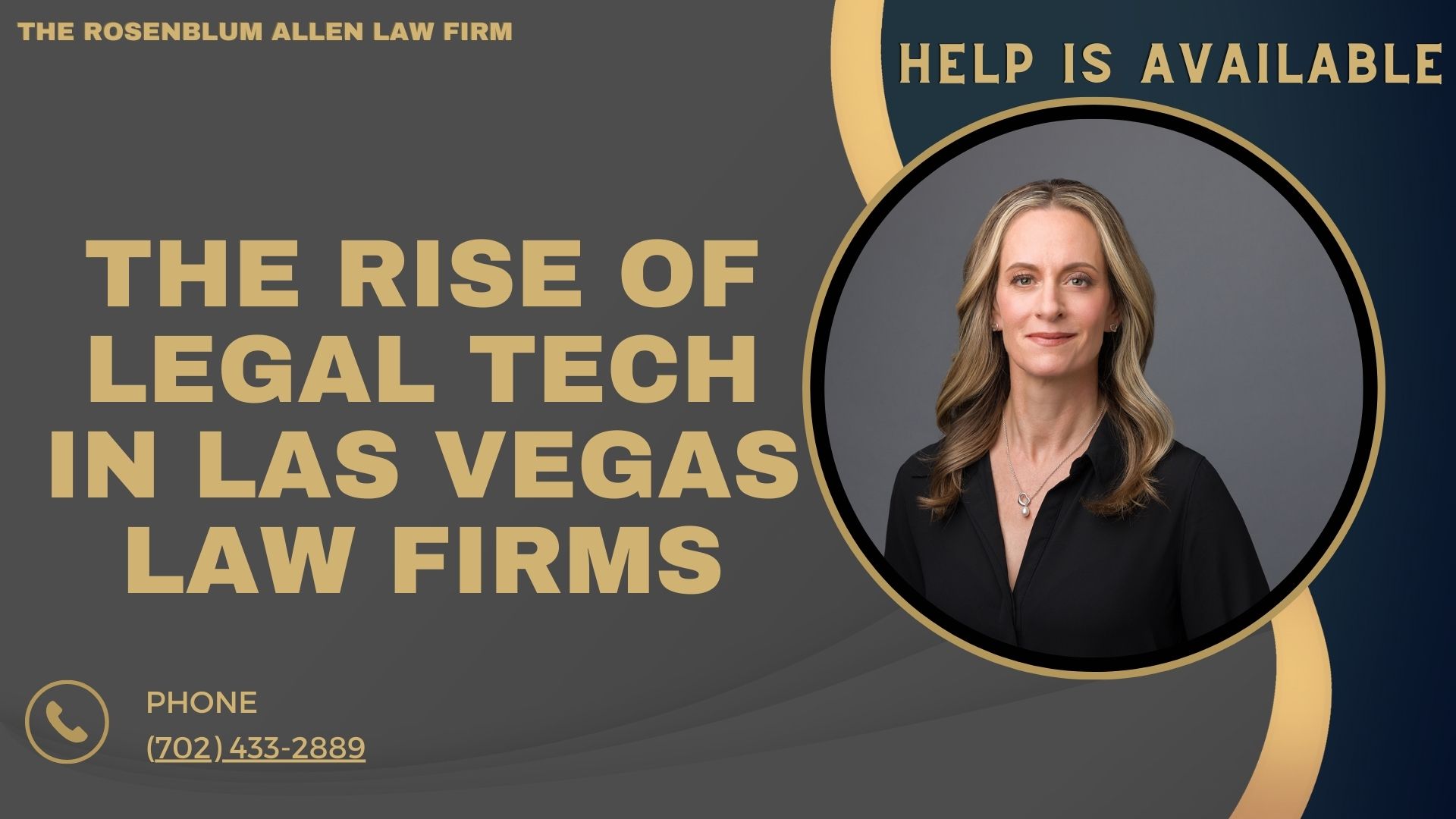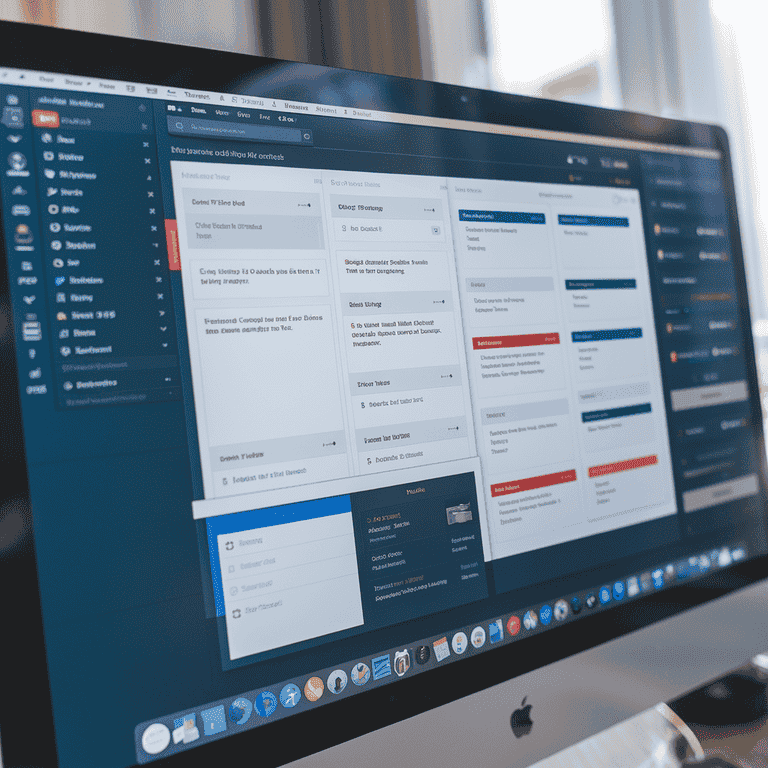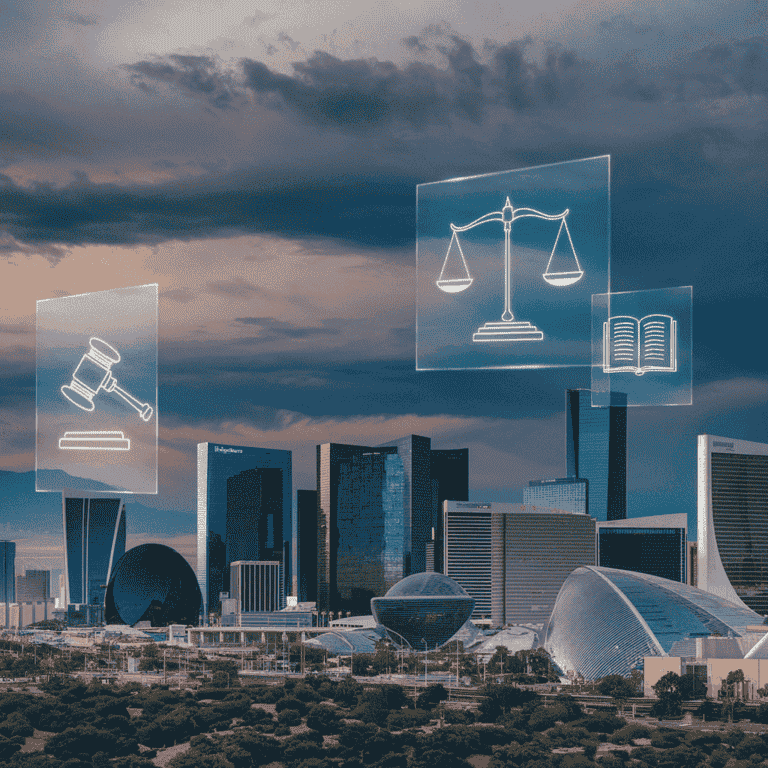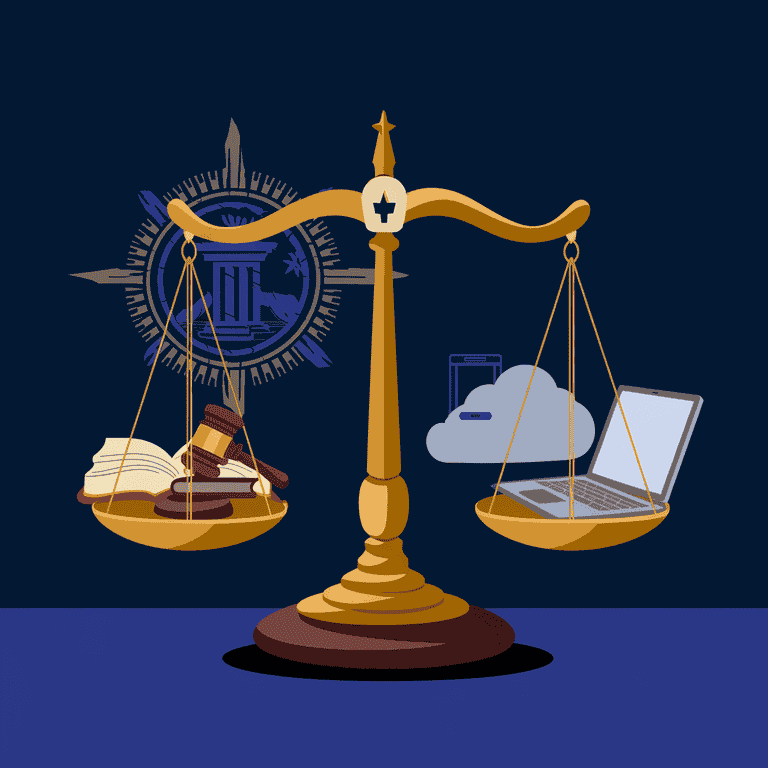Las Vegas law firms are embracing a digital revolution in the heart of the Nevada desert. The neon lights of the Strip aren’t the only things lighting up the city anymore. Legal technology is now illuminating the path forward for attorneys and their clients.

Definition and Scope of Legal Technology
Legal technology, often called “legal tech,” is more than just a buzzword. It’s a game-changer for law firms in Sin City. But what exactly is it?
Legal tech encompasses various software, tools, and platforms to streamline legal processes. From case management systems to AI-powered research tools, these innovations reshape how lawyers work.
The Growing Importance of Tech in Law Practices
Gone are the days when a lawyer’s most advanced technology was a fax machine. Today, technology is as essential to a law firm as a well-tailored suit is to a courtroom appearance.
In Las Vegas, where the legal landscape is as dynamic as the city, embracing tech isn’t just bright—it’s necessary for survival. Firms that adapt thrive, while those that don’t risk being left behind in the digital dust.
Current Legal Tech Landscape in Las Vegas
Popular Legal Tech Tools Used by Vegas Law Firms
Las Vegas law firms are going all-in on legal tech. Here’s a snapshot of the most popular tools making waves in the desert:
Case Management Software
Think of case management software as the Swiss Army knife of legal tech. These platforms do it all:
- Organize case files
- Track deadlines
- Manage billing
- Facilitate client communication
Clio and MyCase are popular choices among Vegas firms. These tools help lawyers spend less time shuffling papers and more time serving clients.
E-Discovery Platforms
In the age of digital evidence, e-discovery platforms are worth their weight in gold chips. Tools like Relativity and Logikcull are helping Vegas lawyers easily sift through mountains of electronic data.
These platforms use advanced algorithms to:
- Identify relevant documents
- Flag potentially privileged information
- Streamline the review process
These tools are as indispensable as a good poker face for firms handling complex litigation.

AI-Powered Legal Research Tools
Remember those long nights in the law library? AI-powered research tools are making them a thing of the past. Platforms like ROSS Intelligence are revolutionizing legal research in Las Vegas.
These tools can:
- Analyze thousands of cases in seconds
- Provide relevant case law and statutes
- Offer predictive insights on case outcomes
It’s like having a brilliant research assistant available 24/7, without needing coffee breaks.
Local Legal Tech Startups and Innovations
Vegas isn’t just about casinos and shows. It’s becoming a hotbed for legal tech innovation. Local startups are emerging, creating solutions tailored to the unique needs of desert law practices.
From specialized software for gaming law to platforms designed for handling personal injury cases in a tourist-heavy city, these homegrown innovations are giving Vegas firms a competitive edge.
As we’ve seen, legal tech is reshaping the landscape for Las Vegas law firms. But this is just the beginning. In the following sections, we’ll explore how these technologies impact firms’ operations, their challenges, and the future of legal tech in a city that never sleeps.
Impact of Legal Tech on Las Vegas Law Firms
Legal tech is changing not just how Vegas lawyers work but also the legal landscape. Let’s roll the dice and see how these changes play out.
Improved Efficiency and Productivity
Remember the days when paralegals spent hours filing documents? Those days are as outdated as a one-armed bandit. With legal tech, efficiency is the name of the game.
- Automated document assembly saves hours of tedious work
- Cloud-based systems allow lawyers to access files from anywhere, anytime
- AI-powered tools complete research tasks in minutes instead of days
The result? Lawyers can focus on what they do best: advocating for their clients. It’s like hitting the jackpot of productivity!
Enhanced Client Services and Satisfaction
In Vegas, customer service is king. The same goes for law firms. Legal tech helps attorneys treat their clients like royalty.
Here’s how:
- Client portals offer 24/7 access to case information
- Automated updates keep clients in the loop without extra effort
- Video conferencing tools facilitate face-to-face meetings, even from a distance
Clients feel more connected and informed. It’s a win-win situation that would make even the most demanding casino boss smile.
Challenges and Adoption Barriers
Adopting new tech can be a gamble, even in a city built on risk-taking. Let’s look at the obstacles Vegas law firms face.
Data Security and Privacy Concerns
In the legal world, confidentiality is as sacred as a royal flush. With cyber threats on the rise, firms are understandably cautious.
Key concerns include:
- Protecting client information from hackers
- Ensuring compliance with data protection regulations
- Maintaining attorney-client privilege in digital communications
It’s a high-stakes game where the consequences of a misstep can be severe.
Training and Implementation Issues
Introducing new tech is like learning a new game at the casino. It takes time, patience, and, often, a bit of frustration.
Challenges include:
- Getting older attorneys to embrace new systems
- Finding time for training without disrupting daily operations
- Ensuring all staff members are proficient in using new tools
The learning curve can be steep, but the payoff is worth it.
Resistance to Change Within Firms
Some lawyers are as set in their ways as a lucky slot machine. Overcoming this resistance is crucial for tech adoption.
Common objections include:
- “We’ve always done it this way.”
- “Technology will replace lawyers.”
- “It’s too complicated to learn.”
Breaking through these barriers requires a mix of education, patience, and demonstrating real-world benefits.

Future Trends in Legal Tech for Las Vegas
What’s next on the tech horizon for Vegas law firms? Let’s peek into our crystal ball.
AI and Machine Learning Applications
AI will become as common in law offices as poker chips in casinos. Future applications could include:
- Predictive analytics for case outcomes
- Automated contract review and drafting
- AI-powered virtual legal assistants
These advancements promise to make legal work faster, more accurate, and more insightful.
Blockchain for Smart Contracts
Blockchain isn’t just for cryptocurrency anymore. In legal tech, it’s poised to revolutionize contract management.
Potential uses include:
- Self-executing contracts that enforce themselves
- Immutable records of agreements and transactions
- Streamlined real estate deals and property transfers
It’s like having a digital dealer who never makes a mistake.
Virtual and Augmented Reality in Legal Proceedings
Imagine presenting a case in a virtual courtroom or using AR to recreate a crime scene. These technologies are on the horizon for Vegas law firms.
Possible applications:
- Virtual depositions and mediations
- Immersive jury presentations
- AR-enhanced site inspections
It brings a new meaning to the phrase “You be the judge.”
As we’ve seen, the future of legal tech in Las Vegas is as bright as the city’s famous skyline. But with new opportunities come new challenges. In the following sections, we’ll explore how Vegas is preparing its legal professionals for this tech-driven future and the ethical considerations that go with it.

Legal Tech Education and Training in Las Vegas
In a city that never stops evolving, legal education is keeping pace. Let’s see how Vegas prepares its legal eagles for the tech revolution.
Law School Curricula Incorporating Tech
Gone are the days when law school was all about dusty books and Latin phrases. Today’s law students in Las Vegas are as likely to learn about algorithms as they are about alimony.
Local law schools are stepping up their game:
- UNLV’s William S. Boyd School of Law offers courses in legal analytics
- Online modules teach students how to use e-discovery platforms
- Guest lectures from legal tech professionals are becoming the norm
It’s like adding a splash of high-tech to the traditional law school cocktail. I was shaken, not stirred!
Continuing Legal Education on Technology
Even seasoned lawyers are hitting the books again. Continuing Legal Education (CLE) programs in Vegas are all-in on tech.
Popular CLE topics include:
- Cybersecurity for law firms
- Ethical considerations in AI-assisted legal work
- Blockchain and smart contracts in legal practice
These programs are helping Vegas lawyers stay as current as the latest slot machine technology.
Regulatory Landscape and Ethical Considerations
As legal tech evolves, so do the rules of the game. Let’s explore how Vegas is navigating these new waters.

Nevada Bar Association’s Stance on Legal Tech
The Nevada Bar isn’t just sitting on the sidelines. They’re actively shaping the future of legal tech in the state.
Key initiatives include:
- Guidelines for the ethical use of AI in legal practice
- Recommendations for secure cloud storage of client data
- Regular updates to professional conduct rules to address tech issues
It’s like having a referee to ensure everyone plays fair in this new tech-driven legal arena.
Success Stories: Vegas Law Firms Embracing Tech
Let’s spotlight some Vegas law firms that are hitting the tech jackpot.
Case Studies of Successful Tech Implementation
Firm A: The E-Discovery Professionals
This mid-size firm specializes in complex litigation. By implementing advanced e-discovery tools, they:
- Reduced document review time by 60%
- Increased accuracy in identifying relevant documents
- Saved clients thousands in billable hours
It’s like they found a secret passage through the document labyrinth!
Firm B: The Client Communication Champs
A small family law practice revolutionized their client interactions:
- Implemented a user-friendly client portal
- Used automated updates to keep clients informed
- Offered virtual consultations for busy clients
The result? Client satisfaction scores went through the roof, which was higher than the Stratosphere Tower!
Measurable Outcomes and Benefits
The benefits of legal tech aren’t just anecdotal. The numbers speak for themselves:
- 40% average reduction in time spent on routine tasks
- 25% increase in client retention rates for firms using client portals
- 50% decrease in errors in document preparation
These stats are as impressive as a royal flush!

Breaking It All Down
Ultimately, the Las Vegas legal scene proves that what happens in Vegas doesn’t always stay in Vegas—sometimes, it sets the stage for the future of law everywhere.
So, as the desert sun sets on our journey through the legal tech world in Las Vegas, we’re left with a vision of a future that’s as exciting as a night out on Fremont Street.
It’s a future where technology and human expertise combine perfectly, creating an efficient, practical legal experience and unmistakably Vegas. The dice have been rolled, the cards are on the table, and the bet is clear: the future of law in Las Vegas is tech-savvy, client-focused, and ready for whatever comes next. Are you prepared to place your bets on the future of legal tech?

Frequently Asked Questions
How can I evaluate if a legal tech solution is cost-effective for my firm?
Consider the total cost of ownership, including implementation, training, and ongoing support. Compare this to the potential time and cost savings the technology could provide. Ask for the vendor’s case studies or ROI calculations to help quantify the benefits.
What security certifications should I look for in a legal tech provider?
If applicable, look for providers with ISO 27001 certification, SOC 2 compliance, and GDPR compliance. Ask about their data encryption methods, access controls, and regular security audits.
How can I ensure the legal tech solution integrates with our existing systems?
Ask the vendor about their integration capabilities and API documentation. Inquire about successful integrations with similar firms and request a demo or trial period to test compatibility with your current tech stack.
What kind of training and support does the legal tech company offer?
Inquire about onboarding processes, ongoing training options, and the availability of customer support. Ask if they provide personalized training sessions, user manuals, or online resources for self-paced learning.
How often does the legal tech company update its software?
Ask about their updated schedule and policy. Regular updates indicate ongoing development and responsiveness to user feedback and industry changes. Inquire how updates are communicated and implemented.
Can the legal tech solution scale with my firm as it grows?
Discuss the solution’s scalability regarding user numbers, data storage, and functionality. Ask about pricing tiers and if any limitations might affect your firm’s growth plans.
How does the legal tech company handle data migration from our current systems?
Inquire about their data migration process, including timelines, data integrity checks, and any assistance they provide during the transition. Ask about potential downtime during migration and how they ensure data accuracy.
What measures are in place to ensure compliance with legal ethics rules when using AI-powered tools?
Ask about built-in safeguards to maintain attorney-client privilege, avoid conflicts of interest, and ensure the confidentiality of sensitive information. Inquire about ethical guidelines or best practices they recommend using their AI tools.
How customizable is the legal tech solution to our firm's needs?
Discuss the level of customization available, such as creating custom fields, workflows, or reports. Ask if they offer professional services for more complex customizations.
What is the company's track record in the legal industry?
Inquire about their experience working with law firms, client retention rates, and industry awards or recognitions. Ask for references from firms similar to yours in size and practice areas.

Additional Resources for You from The Rosenblum Allen Law Firm.
Molly Rosenblum Allen, Esq., has created additional resources to assist you in your time of need. These comprehensive guides cover various aspects of criminal defense and legal representation:
- Criminal Defense Attorneys: Comprehensive guide to criminal defense strategies and your rights.
- Las Vegas DUI Lawyer: Essential information on DUI laws, penalties, and defense options in Las Vegas.
- Domestic Violence Lawyer Las Vegas: Understanding domestic violence charges and how to protect your rights.
- Drug Possession Lawyer: Insights into drug possession laws and potential defense strategies.
- Sex Crimes Attorney: Detailed information on sex crime laws and the importance of experienced representation.
- CPS Defense Attorney: Guidance on dealing with Child Protective Services and defending against abuse allegations.
- Misdemeanor Lawyer: Understanding misdemeanor charges and their potential impacts.
- Las Vegas Warrant Defense Attorney: How to handle outstanding warrants and protect your freedom.
- Las Vegas Probation Violation Attorney: Navigating probation violations and potential consequences.
- Theft Crime Defense Lawyer: Overview of theft crimes and effective defense strategies.
- Kidnapping Lawyers: Understanding kidnapping charges and their serious implications.
- Juvenile Defense Lawyers: Specialized information on juvenile law and protecting young defendants.
- Firearms Lawyer Las Vegas: Navigating complex firearms laws and regulations in Las Vegas.

Offsite Resources for You
American Bar Association: Offers a wealth of resources on legal technology and practice management.
Fastcase: Provides free access to legal research for bar association members in many states.
Casetext: Offers AI-powered legal research tools and some free access to case law.
Public Library of Law: Provides free access to case law, statutes, regulations, court rules, and legal forms.
FindLaw: Offers free legal information for consumers and professionals.
Justia: Provides free case law, codes, regulations, legal articles, and other resources.
SSRN: Hosts a large database of early-stage research papers in many fields, including law.

A Special Message from Our Lead Attorney, Molly Rosenblum Allen, Esq

Dear Reader,
Thank you for taking the time to read through these resources. I hope you’ve found the information valuable and insightful. At The Rosenblum Allen Law Firm, we understand that facing legal challenges can be overwhelming, and we’re committed to providing the guidance and support you need.
If you’re ready to take the next step in addressing your legal situation, I invite you to contact me and my team. We’re here to listen, understand your unique circumstances, and develop a strategic approach tailored to your needs. Please don’t hesitate to call us at (702) 433-2889. Let’s get the ball rolling on your case and work towards the best possible outcome.
Every case is unique, and time can be a critical factor. We look forward to the opportunity to assist you and provide the experienced legal representation you deserve.
Warm regards,
Molly Rosenblum Allen, Esq.





